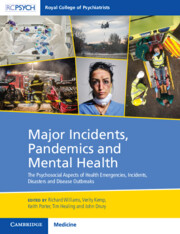 Major Incidents, Pandemics and Mental Health
Major Incidents, Pandemics and Mental Health from Section 7 - Key Lessons for the Way Forward
Published online by Cambridge University Press: 11 January 2024
The editors create an agenda of themes for developing services and practitioners, and for research capable of responding to psychosocial aspects of emergencies, incidents, disasters, and disease outbreaks (EIDD) and their deleterious effects. Topics include the perspectives of scientists, practitioners, and the public, the historical importance of how current capabilities have developed, the critical theme of agreeing definitions, recognising the wellbeing, psychosocial, and mental health agendas that face survivors of EIDD in their recovery, the fallacies of basing planning on panic and the belief that survivors of subsequent EIDD fare better than first timers, and the importance of good communication within and between agencies and then with the public, and of teams and their leadership. It recognises the lessons from the social sciences, and the importance of social support, psychological safety, and our relationships in our recovery. This book strongly supports the notion that there is no health without mental health.
To save this book to your Kindle, first ensure no-reply@cambridge.org is added to your Approved Personal Document E-mail List under your Personal Document Settings on the Manage Your Content and Devices page of your Amazon account. Then enter the ‘name’ part of your Kindle email address below. Find out more about saving to your Kindle.
Note you can select to save to either the @free.kindle.com or @kindle.com variations. ‘@free.kindle.com’ emails are free but can only be saved to your device when it is connected to wi-fi. ‘@kindle.com’ emails can be delivered even when you are not connected to wi-fi, but note that service fees apply.
Find out more about the Kindle Personal Document Service.
To save content items to your account, please confirm that you agree to abide by our usage policies. If this is the first time you use this feature, you will be asked to authorise Cambridge Core to connect with your account. Find out more about saving content to Dropbox.
To save content items to your account, please confirm that you agree to abide by our usage policies. If this is the first time you use this feature, you will be asked to authorise Cambridge Core to connect with your account. Find out more about saving content to Google Drive.